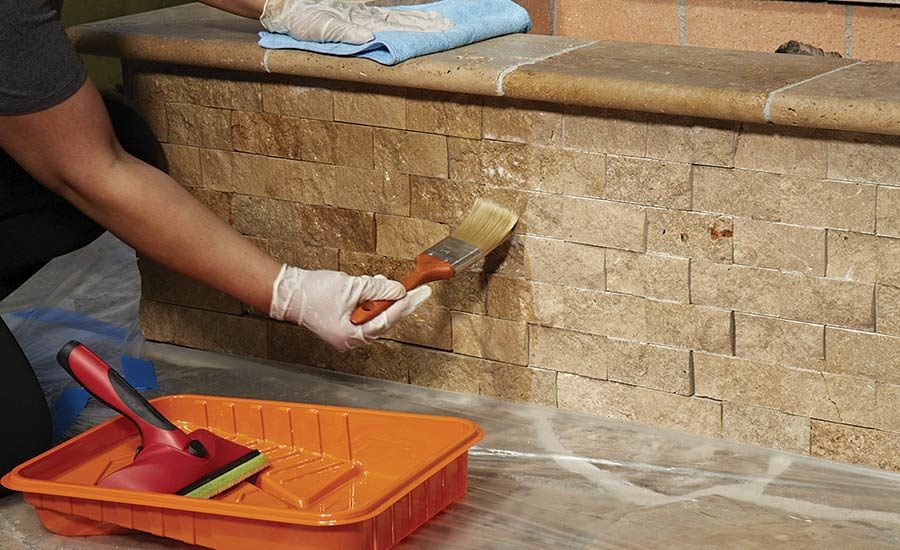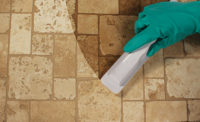Natural stone is one of the oldest, and certainly the most time-tested, of building materials known to man. Its beauty, durability, long life cycle and low-maintenance qualities make it the choice of many architects for commercial and institutional applications. Now, homeowners are also seeking the same functions in new residences and remodels. With a wider consumer base than ever, there are some simple, yet important, tips to know when using natural stone when it comes to proper care and maintenance. This article will focus on the importance of sealing to protect natural stone and the often overlooked role that a proper maintenance program plays in the ultimate success of residential stone installations.
Protection
When determining where to start, the question of “Do all natural stones need to be sealed?” must be answered. While all natural stone is porous to one extent or another, the honest answer here is no. We should take into consideration the answers to several key questions in determining the need to seal. Where is the stone being installed? Will it be installed on a kitchen countertop, a lobby floor in a condo tower, a backyard patio or in a shower? Depending on the type of stone and the area, the need or benefit to sealing can vary, as can the maintenance products and program needed. These variables, plus the owners’ expectations, need to be discussed at the very start of the project. This will ensure that all parties are in agreement and that performance and expectations are aligned.
Next, the commonly asked question “What is the purpose or benefit of a sealer?” needs to be answered and understood. Sealers are primarily designed to deliver two benefits to the installation: 1) provide a given degree of stain resistance and 2) a certain amount of reaction time to remove a contaminant. If the concern is to repel dirt, mud and common water-based stains, then a general purpose water- and stain-repellent sealer will work just fine. If the concern is food and/or exposure to harsh chemical cleaning agents, or simply to provide the highest level of protection and life expectancy, then a premium-quality water- and stain-repellent will be required. As with most any product purchased, price typically dictates performance in choosing the appropriate sealer. This is a good general rule of thumb, but is not always the case.
While some prefer the look and appeal of an Old World, rustic European-style installation, most consumers would like their stone to look essentially the same 10 years from now as it did when originally installed. Sealers can definitely help here for most applications. Performing a simple test on the stone with contamina common to the area(s) of use can prove most helpful in assessing the need and benefit to using a sealer.
With all of the variables and sealer options available, the question of “What type of sealer is best for natural stone?” should be answered. There are three main categories to consider when it comes to aesthetics. First, natural-look impregnating or penetrating sealers do not change the appearance of the stone and can be used for both interior and exterior applications. Second, color enhancing sealers are extremely popular and are also impregnating or penetrating in nature. These products deepen and enrich the color of the stone, but do not change the surface sheen, texture or slip resistance. Most are designed for interior use only, but some are suitable for exterior installations. The last category is topical or coating sealers. These products can bring out some color in the stone, while providing a low- to high-sheen finish. They are generally recommended for interior applications and will change the slip resistance to a certain degree, so testing and discussion with the manufacturer is recommended to determine suitability. Most companies offer a toll-free number for technical assistance and welcome questions up front to help identify the best sealer for the installation and application. Websites are also a great place to get information, and some companies offer a live chat service to further assist customers in making the right choices.
Once the need and type of sealer is decided on, the natural question of “How often should I reseal?” should be addressed. The reality is that it depends on many factors which include: Is the installation residential or commercial? Is it interior or exterior? Is it an entry or a shower? Will it have wear-and-tear from five or 5,000 people a day? Is it a floor or a wall? And lastly, how will it be maintained? The latter will be addressed in our discussion on a proper maintenance program to follow. There are two ways to narrow the estimated life and need to reseal. The first is to call the manufacturer and give them the answers to these questions for a rough approximation of what can be expected. The second is to do a periodic water droplet test or look for water penetration (darkening) when the installation is cleaned. While this is not an exact science, chances are if water is darkening or absorbing into the stone, so will more sealer.
Maintenance
While natural stone is an extremely beautiful and durable material with a storied past spanning thousands of years, it must be noted that there is no such thing as a maintenance-free installation. However, stone is inherently low-maintenance, and when combined with the use of a sealer (when and where needed) in combination with a proper maintenance program, it will provide decades of satisfaction in even the most challenging applications.
A good program consists of three essential components: Product, Procedure and Equipment (PPE). When these three elements are used in the daily or routine cleaning as well as periodic heavy-duty maintenance, they will determine the overall success or failure of the installation and satisfaction of the owner.
Some factors to know and consider when determining the best maintenance program will include characteristics such as surface texture, type of stone, area of use (such as food exposure), interior or exterior, floors, counters or walls, etc. and amount of use. All of these variables will influence and determine what decisions need to be made related to PPE. Discussing these with the stone supplier and manufacturer of the care products are essential to ensure that the customer’s expectations are realistic and achievable with the right material and program. Nevertheless, whether it is a shopping mall floor or the entry of a home, natural stone still requires appropriate maintenance to keep it looking its best.
For daily or routine maintenance of floors, often dust mopping with a good microfiber mop is sufficient. Also, using a vacuum is ideal to pick up everyday dirt, dust and common debris that may get tracked across the floor. For countertops and walls, the use of a mild pH neutral cleaner will keep these surfaces looking great in most applications. Showers may require the use of a little stronger cleaner to remove soap scum, hard water, etc., but when done routinely, this will help prevent buildup and the need for more aggressive cleaners and procedures. With regard to equipment, using nylon pads or scrub brushes may need to be used to achieve the desired result. Always check that these are non-scratching and suitable for natural stone. Understanding the stone’s hardness, finish/texture and the contaminants to be cleaned in relation to the use of the right brushes or pads is extremely important.
When choosing the right cleaner for daily/routine cleaning, a pH neutral product designed for the maintenance of stone is highly recommended to avoid the damaging effects of most common household and commercial cleaners. Everyday grocery store and or commercial cleaners found at many janitorial supply stores contain acids, bleaches, caustic and corrosive agents and abrasives that can permanently damage the stone and remove any sealer present, often within weeks or months of use. If the stone has been sealed, using products designed for the care of natural stone will help ensure maximum performance of the sealer and maintain the beauty and function of the installation.
Even with a proper routine maintenance program, all installations will require some type of deep cleaning. When periodic heavy-duty cleaning is required, using specialty cleaners that are also designed for natural stone are a must. These products tend to be alkaline in make-up and are extremely good at deep cleaning the surface, degreasing and restoring the installation to its original appearance. The frequency will vary and may need to be done once a year or up to monthly for some installations, as needed. Again, contacting the manufacturer of the maintenance products, the supplier and or equipment manufacturer (for commercial installations) is always recommended to help understand and identify the relevant factors for each project.
In summary, following these simple recommendations will help customers achieve their desired results while saving time and money and avoiding some of the most common mistakes and misunderstandings. By using sealers when needed and implementing a proper care and maintenance program, natural stone’s timeless appeal, versatility, function and simplicity will help ensure a storied and timeless future.










